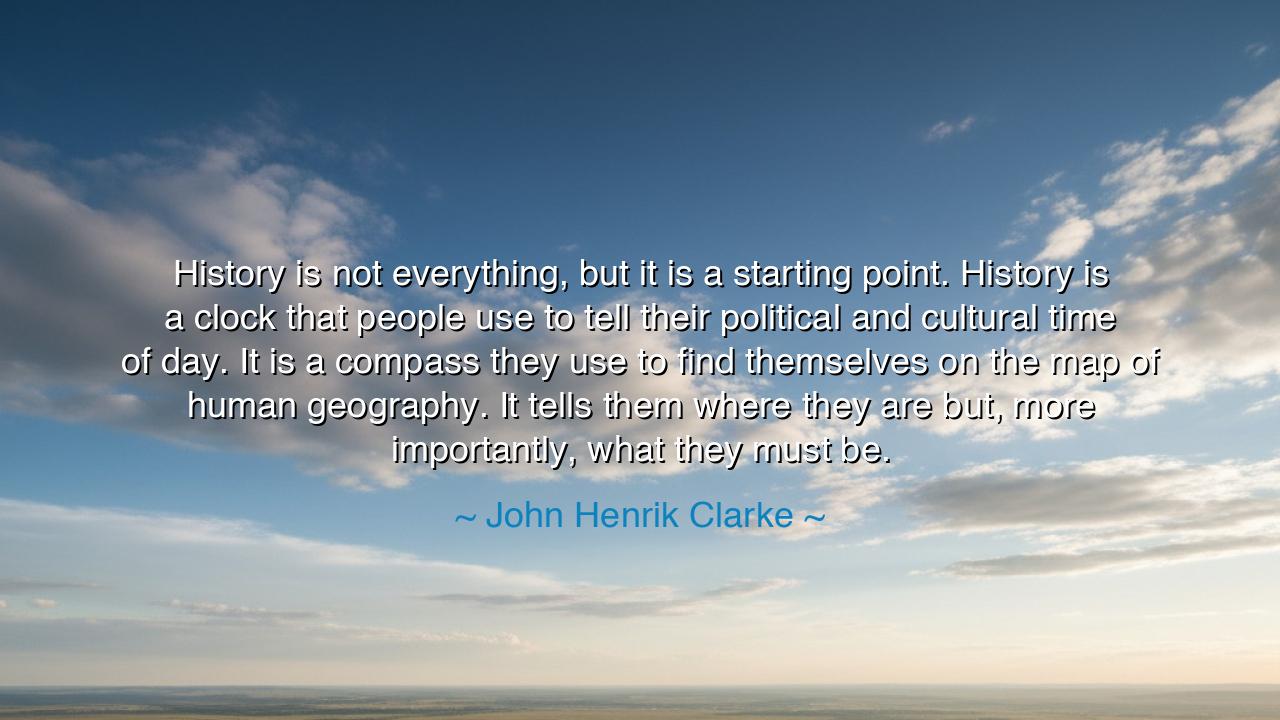
History is not everything, but it is a starting point. History is
History is not everything, but it is a starting point. History is a clock that people use to tell their political and cultural time of day. It is a compass they use to find themselves on the map of human geography. It tells them where they are but, more importantly, what they must be.






“History is not everything, but it is a starting point. History is a clock that people use to tell their political and cultural time of day. It is a compass they use to find themselves on the map of human geography. It tells them where they are but, more importantly, what they must be.” Thus spoke John Henrik Clarke, the great historian and teacher of the African diaspora, whose voice rose like thunder against the silence of forgotten heritage. His words are not mere reflection — they are an awakening. For in this age, when so many walk without memory, Clarke reminds us that history is the root of identity, the instrument by which a people knows both its wounds and its worth.
To Clarke, history is not a list of dates or the dust of old empires — it is a living force, the rhythm that beats beneath every civilization. It is the clock by which nations tell their “political and cultural time of day,” meaning it shows not only where a people has been, but what stage of consciousness they have reached. A people who have forgotten their history live perpetually in twilight, unable to tell whether they are in dawn or dusk. Without history, the present becomes a maze, and the future, a fog. But those who remember — who study their past with clear eyes — walk in the light of self-knowledge, knowing both the hour and the direction of their destiny.
The compass of which Clarke speaks is no ordinary tool. It is the map of meaning that locates a people in the vast terrain of humanity. It tells them not only where they stand geographically, but spiritually. For when history is erased or distorted, the soul of a people is disoriented. Clarke, a scholar of African and world civilizations, saw how centuries of colonization and false narratives had torn countless nations from their own stories. He sought to restore that compass, to give back to his people the knowledge that they were not born in chains, but descended from builders of kingdoms, keepers of wisdom, and creators of art and law long before conquest. In restoring history, he restored direction — and with direction, dignity.
Consider, for example, the story of Haiti, the first Black republic in the modern world. In 1804, men who had been enslaved rose up under Toussaint Louverture and Jean-Jacques Dessalines to defeat the armies of Europe. They did not fight merely for survival; they fought with memory — memory of who they were before slavery, memory of freedom in their blood. History was their compass, guiding them through the storm of oppression toward a new dawn. But when later generations were taught only the stories of defeat and dependency, their compass was shattered. So too, Clarke warns, does every people perish when they lose sight of their own greatness.
Yet Clarke’s wisdom extends beyond nations to the soul of every individual. Each person carries within them a personal history, a map of their becoming. To deny it — to cut oneself off from one’s own past — is to wander in confusion. The ancients knew this: that wisdom begins in remembrance. The Egyptian priests taught, “Know thyself,” for to know oneself is to recall the journey that shaped one’s being. And so Clarke, like a prophet, cries out to the modern world: Do not let others write your history for you, or you will live by their design, not your own. To study your history is to seize back the pen that writes your destiny.
But there is in his words also a deeper summons — not merely to know where we are, but “what we must be.” For history is not a shrine, but a seed. It is not the worship of the past, but the awakening of purpose. The lessons of those who came before are not meant to bind us in nostalgia, but to teach us how to move forward with strength and humility. The past is not an anchor, but a foundation. It teaches us what mistakes to avoid, what virtues to preserve, what dreams still remain unfinished. To understand history is to inherit responsibility — the task of building the future that the ancestors began.
Therefore, my children, let this teaching be your light: honor your history, for it is the mirror in which you will see your truest self. Do not let it be buried, twisted, or forgotten. Read it not with despair, but with pride and clarity. Ask of it not only “What happened?” but “What must I now do?” Let the clock of history tell you that your time has come; let the compass of heritage point you toward your highest purpose. For when you know your past, you are no longer lost.
And thus remember the wisdom of John Henrik Clarke: history is both clock and compass, both measure and meaning. It tells you the hour of your becoming, and the path of your becoming. To know it is to awaken; to live by it is to rise. For a people who know their story can never again be enslaved — not by chains, nor by ignorance, nor by time itself.






AAdministratorAdministrator
Welcome, honored guests. Please leave a comment, we will respond soon